Merge Sort implementation in C The implementation for Merges
Merge Sort implementation in C++
The implementation for Mergesort given in Section 7.4 takes an array as input and soils that array. At the beginning of Section 7.4 there is a simple pseudocode implementation for sorting a linked list using Mergesort. Implement both a linked list-based version of Mergesort and the array-based version of Mergesort. and compare and analyze their running times.Solution
/* Merger sort array-based version */
/* C program for Merge Sort */
#include<stdlib.h>
#include<stdio.h>
// Merges two subarrays of arr[].
// First subarray is arr[l..m]
// Second subarray is arr[m+1..r]
void merge(int arr[], int l, int m, int r)
{
int i, j, k;
int n1 = m - l + 1;
int n2 = r - m;
/* create temp arrays */
int L[n1], R[n2];
/* Copy data to temp arrays L[] and R[] */
for (i = 0; i < n1; i++)
L[i] = arr[l + i];
for (j = 0; j < n2; j++)
R[j] = arr[m + 1+ j];
/* Merge the temp arrays back into arr[l..r]*/
i = 0; // Initial index of first subarray
j = 0; // Initial index of second subarray
k = l; // Initial index of merged subarray
while (i < n1 && j < n2)
{
if (L[i] <= R[j])
{
arr[k] = L[i];
i++;
}
else
{
arr[k] = R[j];
j++;
}
k++;
}
/* Copy the remaining elements of L[], if there
are any */
while (i < n1)
{
arr[k] = L[i];
i++;
k++;
}
/* Copy the remaining elements of R[], if there
are any */
while (j < n2)
{
arr[k] = R[j];
j++;
k++;
}
}
/* l is for left index and r is right index of the
sub-array of arr to be sorted */
void mergeSort(int arr[], int l, int r)
{
if (l < r)
{
// Same as (l+r)/2, but avoids overflow for
// large l and h
int m = l+(r-l)/2;
// Sort first and second halves
mergeSort(arr, l, m);
mergeSort(arr, m+1, r);
merge(arr, l, m, r);
}
}
/* UTILITY FUNCTIONS */
/* Function to print an array */
void printArray(int A[], int size)
{
int i;
for (i=0; i < size; i++)
printf(\"%d \", A[i]);
printf(\"\ \");
}
/* Driver program to test above functions */
int main()
{
int arr[] = {12, 11, 13, 5, 6, 7};
int arr_size = sizeof(arr)/sizeof(arr[0]);
printf(\"Given array is \ \");
printArray(arr, arr_size);
mergeSort(arr, 0, arr_size - 1);
printf(\"\ Sorted array is \ \");
printArray(arr, arr_size);
return 0;
}
--------------------------------------------------------------------------------------------------------------------
/* merge sort link-list version
#include<stdio.h>
#include<stdlib.h>
/* Link list node */
struct node
{
int data;
struct node* next;
};
/* function prototypes */
struct node* SortedMerge(struct node* a, struct node* b);
void FrontBackSplit(struct node* source,
struct node** frontRef, struct node** backRef);
/* sorts the linked list by changing next pointers (not data) */
void MergeSort(struct node** headRef)
{
struct node* head = *headRef;
struct node* a;
struct node* b;
/* Base case -- length 0 or 1 */
if ((head == NULL) || (head->next == NULL))
{
return;
}
/* Split head into \'a\' and \'b\' sublists */
FrontBackSplit(head, &a, &b);
/* Recursively sort the sublists */
MergeSort(&a);
MergeSort(&b);
/* answer = merge the two sorted lists together */
*headRef = SortedMerge(a, b);
}
/* See http://geeksforgeeks.org/?p=3622 for details of this
function */
struct node* SortedMerge(struct node* a, struct node* b)
{
struct node* result = NULL;
/* Base cases */
if (a == NULL)
return(b);
else if (b==NULL)
return(a);
/* Pick either a or b, and recur */
if (a->data <= b->data)
{
result = a;
result->next = SortedMerge(a->next, b);
}
else
{
result = b;
result->next = SortedMerge(a, b->next);
}
return(result);
}
/* UTILITY FUNCTIONS */
/* Split the nodes of the given list into front and back halves,
and return the two lists using the reference parameters.
If the length is odd, the extra node should go in the front list.
Uses the fast/slow pointer strategy. */
void FrontBackSplit(struct node* source,
struct node** frontRef, struct node** backRef)
{
struct node* fast;
struct node* slow;
if (source==NULL || source->next==NULL)
{
/* length < 2 cases */
*frontRef = source;
*backRef = NULL;
}
else
{
slow = source;
fast = source->next;
/* Advance \'fast\' two nodes, and advance \'slow\' one node */
while (fast != NULL)
{
fast = fast->next;
if (fast != NULL)
{
slow = slow->next;
fast = fast->next;
}
}
/* \'slow\' is before the midpoint in the list, so split it in two
at that point. */
*frontRef = source;
*backRef = slow->next;
slow->next = NULL;
}
}
/* Function to print nodes in a given linked list */
void printList(struct node *node)
{
while(node!=NULL)
{
printf(\"%d \", node->data);
node = node->next;
}
}
/* Function to insert a node at the beginging of the linked list */
void push(struct node** head_ref, int new_data)
{
/* allocate node */
struct node* new_node =
(struct node*) malloc(sizeof(struct node));
/* put in the data */
new_node->data = new_data;
/* link the old list off the new node */
new_node->next = (*head_ref);
/* move the head to point to the new node */
(*head_ref) = new_node;
}
/* Drier program to test above functions*/
int main()
{
/* Start with the empty list */
struct node* res = NULL;
struct node* a = NULL;
/* Let us create a unsorted linked lists to test the functions
Created lists shall be a: 2->3->20->5->10->15 */
push(&a, 15);
push(&a, 10);
push(&a, 5);
push(&a, 20);
push(&a, 3);
push(&a, 2);
/* Sort the above created Linked List */
MergeSort(&a);
printf(\"\ Sorted Linked List is: \ \");
printList(a);
getchar();
return 0;
}
--------------------------------------------------------------------
Merge sort performs more \"short range\" operations on the data, making it more suitable for linked lists compare to array.
----------------------------------------------------------------------
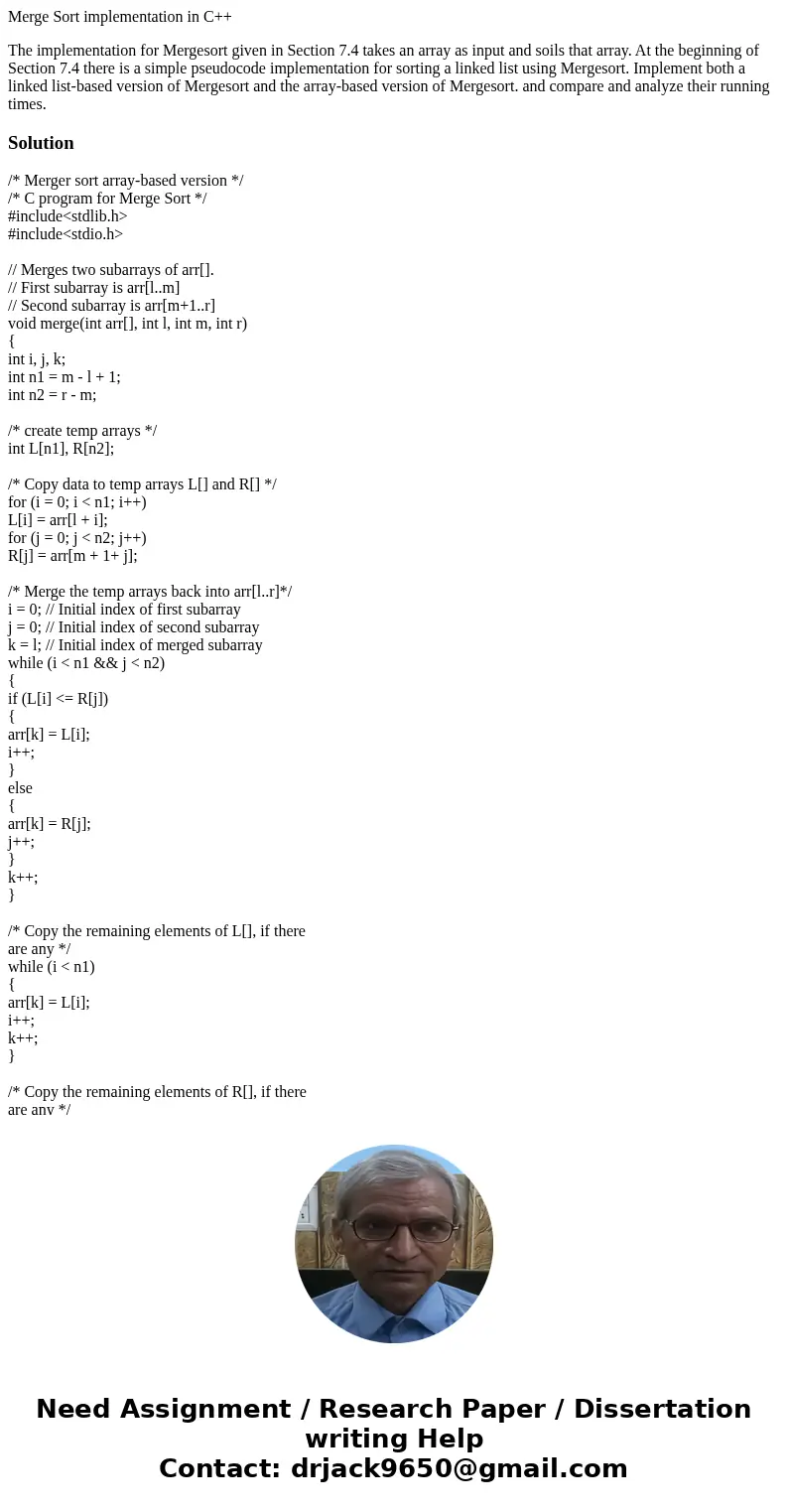
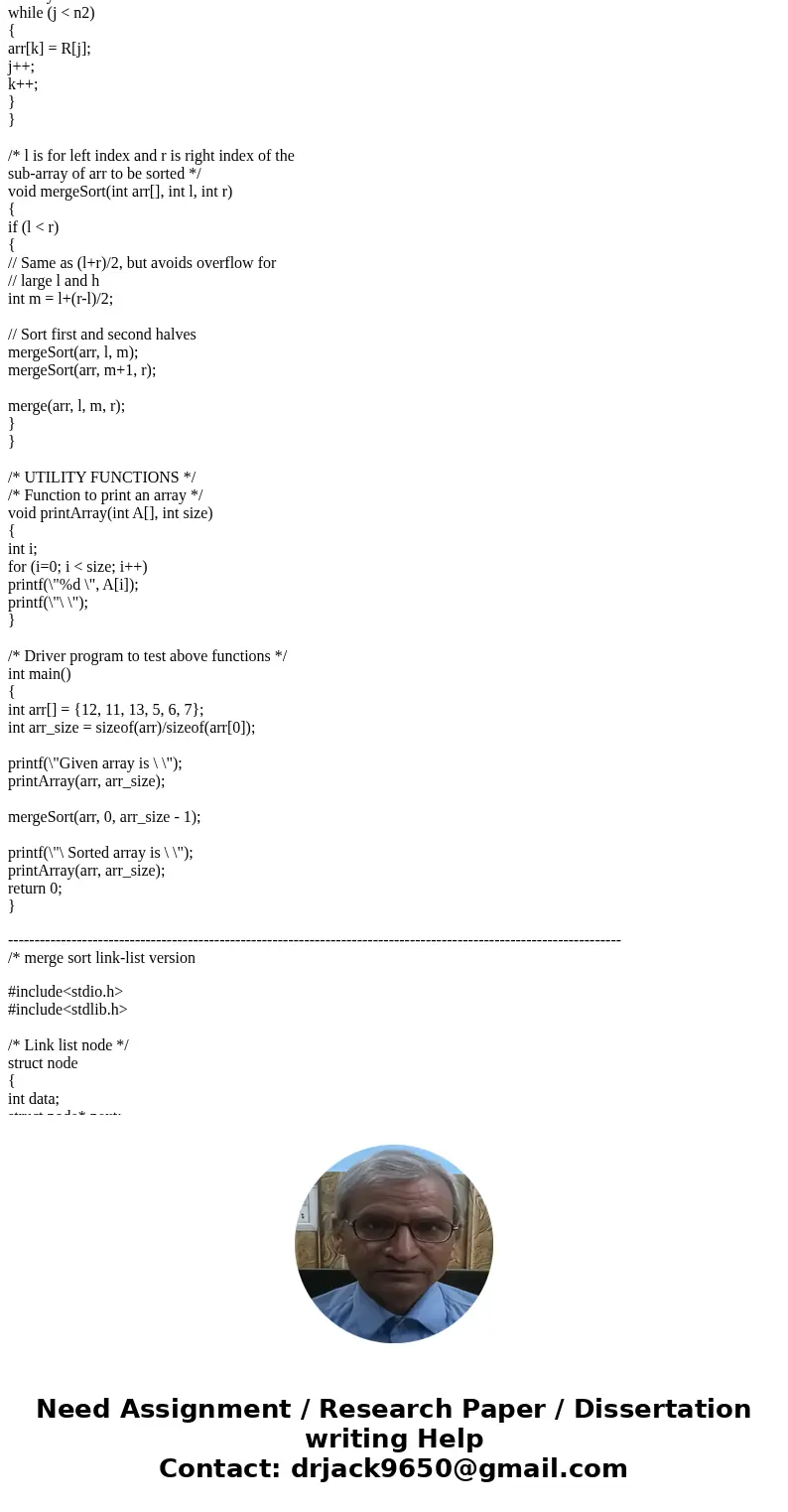
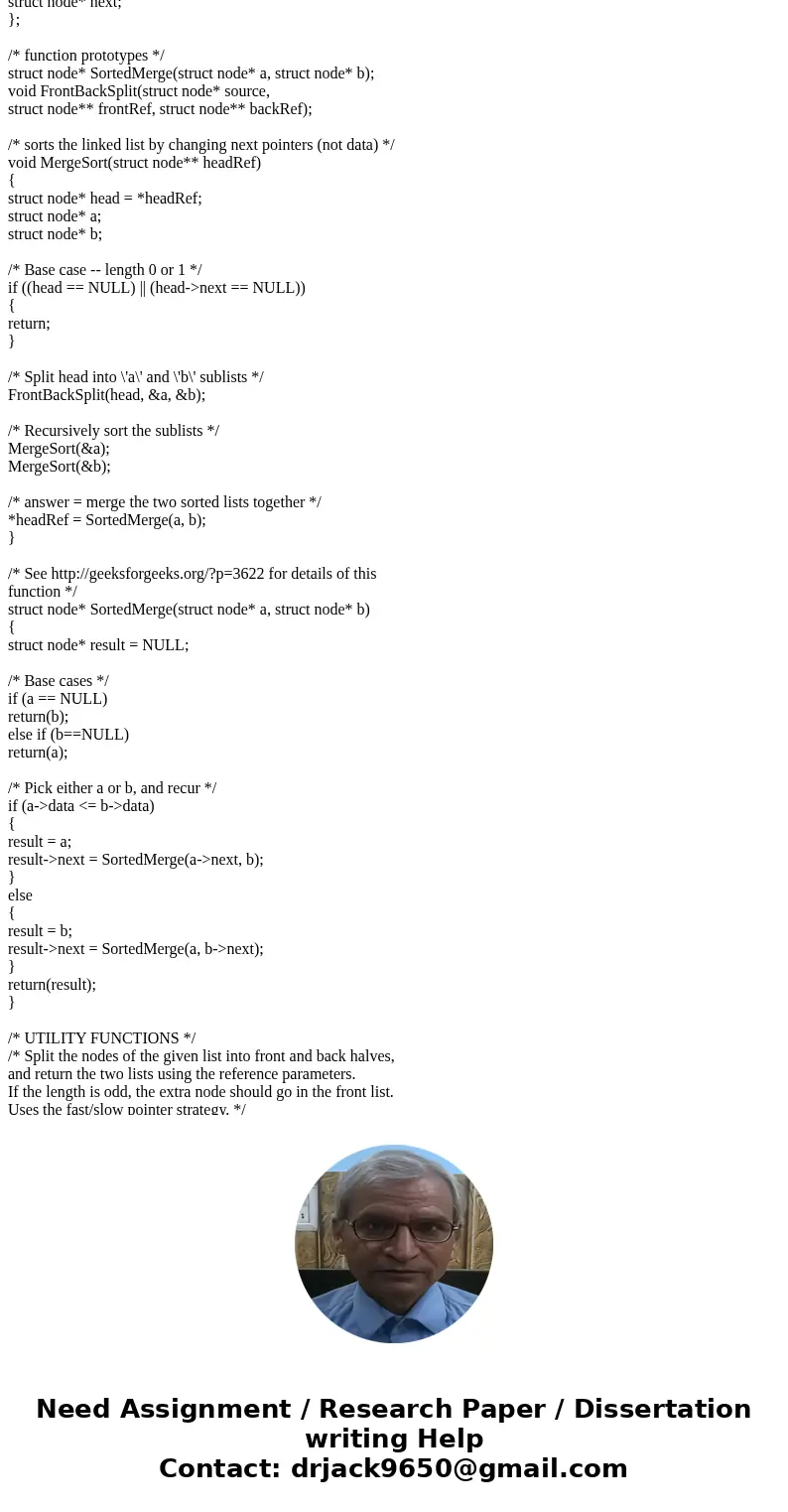
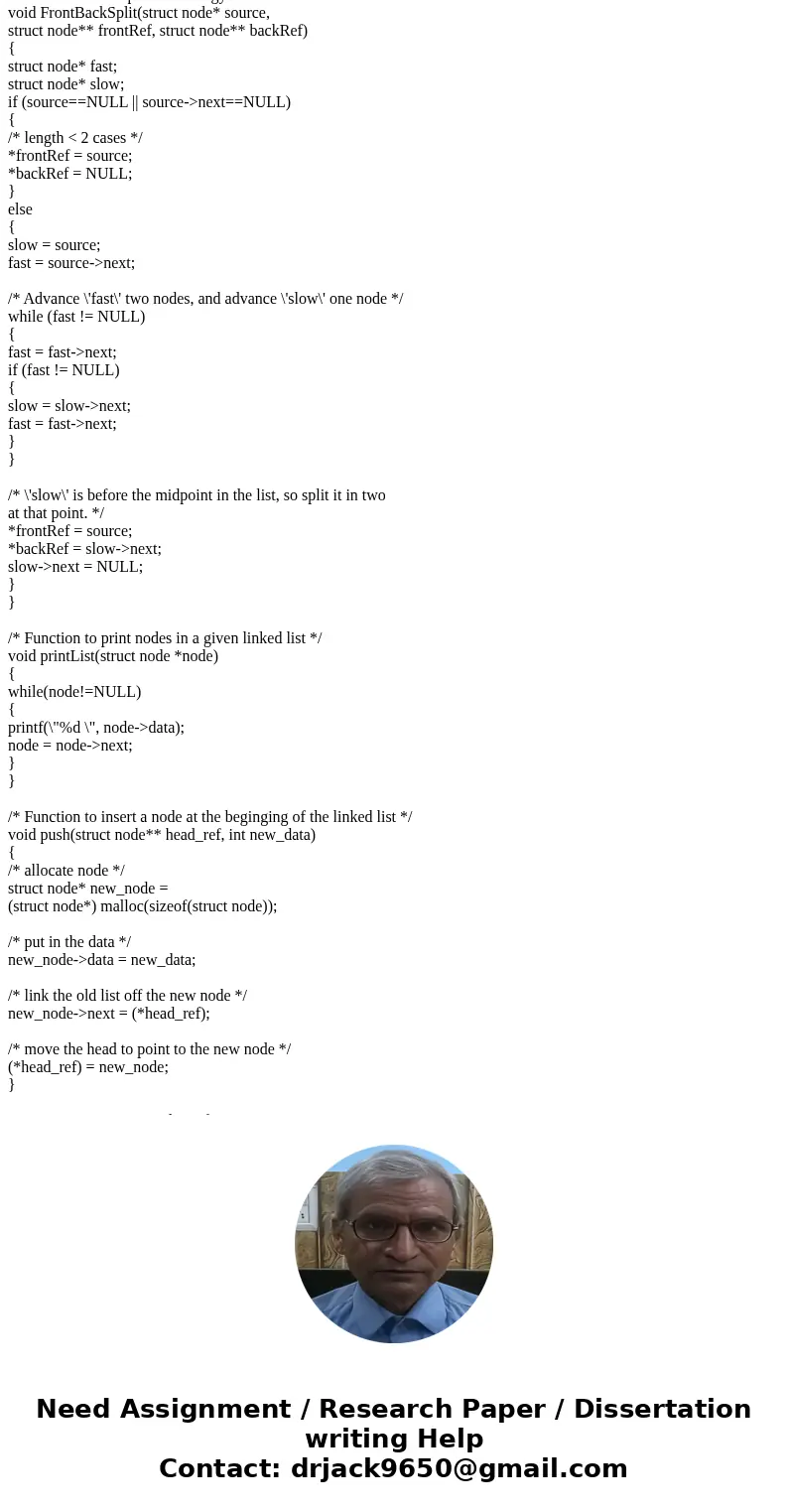
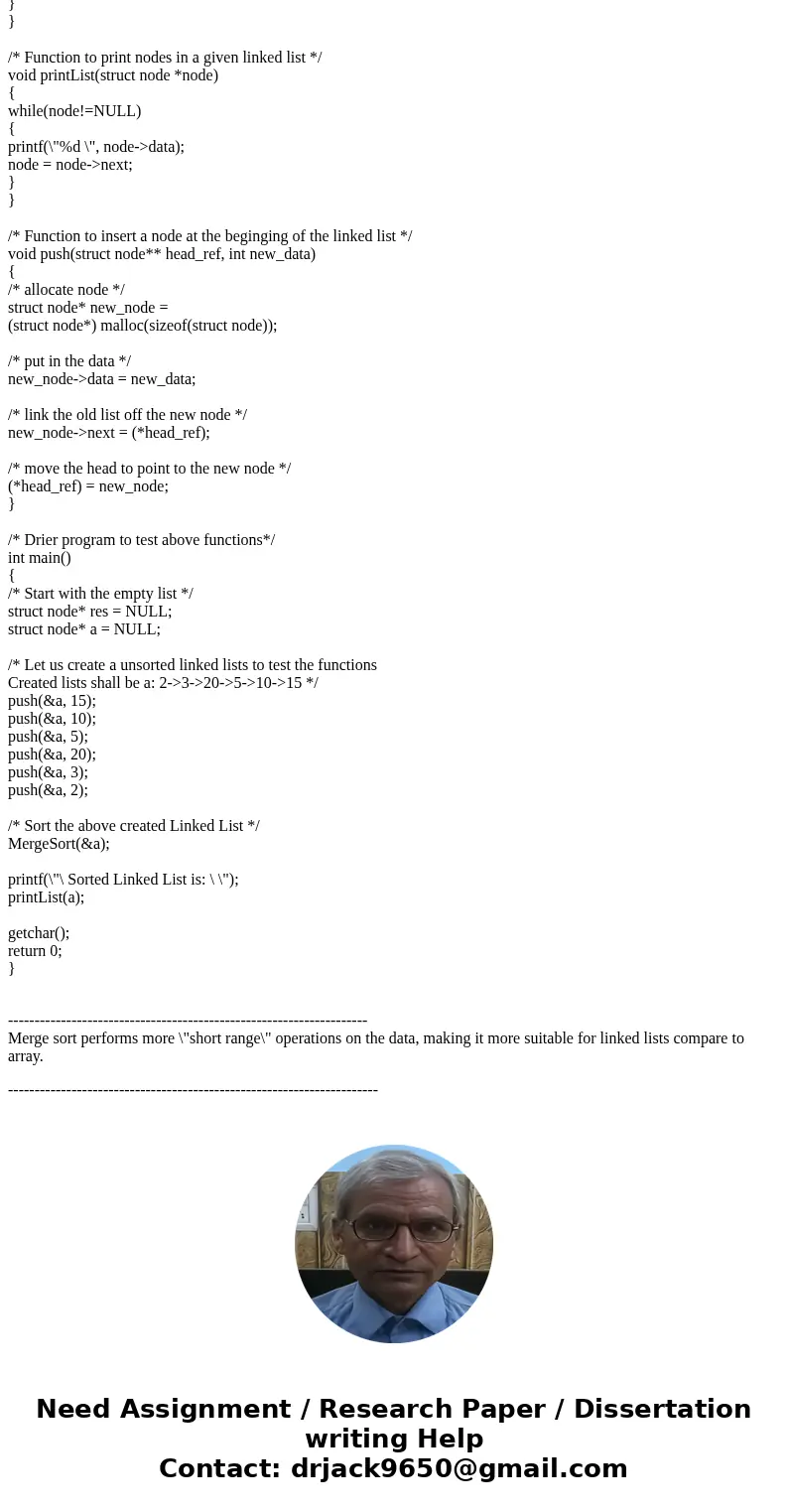
 Homework Sourse
Homework Sourse